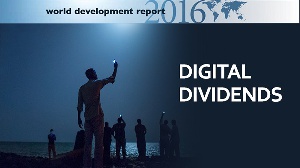- Home - News
- TWI News | TV
- Polls
- Year In Review
- News Archive
- Crime & Punishment
- Politics
- Regional
- Editorial
- Health
- Ghanaians Abroad
- Tabloid
- Africa
- Religion
- Election 2020
- Coronavirus
- News Videos | TV
- Photo Archives
- News Headlines
- Press Release
Business News of Thursday, 25 October 2018
Source: Andrew Stewart
OPINION: How to reap Ghana’s digital dividend
Since the discovery of offshore oil in 2007, Ghana has been on a steady upward trajectory. Between 1991 and 2015, the country was one of the few Sub-Saharan African countries to reach the Millenium Development Goal of halving extreme poverty and today the “Black Star” claims the title of Africa’s second-fastest growing economy.
While Kenya has led East Africa in financial technology, Ghana is quickly emerging as West Africa’s most innovative digital economy. More than 37% of payments in Ghana today are digital, according to a 2017 report from the Better than Cash Alliance, and much of that has been change has been driven by the government digitising its own payments systems.
But for consumers, the most striking development has been the rapid growth of mobile money. In 2012, only 3% of Ghanaians possessed a mobile money account, now nearly 40% of the population now possess mobile money account. That adds up to a 70% increase in active mobile money users and 125% increase in the total value of transactions.
In the field of digital remittances, the gains moving online can be huge. Still a largely cash-based industry, the switch to online is happening quickly across the globe but accelerating most quickly in countries with mobile money services.
These recent strides in digitisation, particularly in access to digital financial services, will not only improve transparency, accelerate economic growth, and empower women and rural communities, but they will also help the nation get one step closer to its vision to its vision of a “Ghana Beyond Aid.”
Of transactions sent to Ghana via WorldRemit, nearly half are sent directly to mobile money accounts, a figure that is only set to increase, particularly in rural areas for those who might not be connected to the banking system.
In countries like Tanzania and Uganda, which have an even higher penetration of mobile money, the percentage of our rural customers receiving mobile money swells to over 90%, which points to the potential for mobile money penetration to help close Ghana’s rural-urban divide.
Mobile-enabled remittances can reduce the cost of transfers between 2.7% and 3.3%. When you consider that remittances from the UK to Ghana alone amount to $298 million annually (five times the UK’s Ghana aid budget), those savings add up to $8 - $10 million each year.
Beyond the obvious benefit of enhanced financial access, mobile financial services are laying the foundation for a vast array of sophisticated services which are empowering people to live healthy and independent lives e. In Ghana alone, Tigo has debuted mBirth, a mobile-enabled birth registration program which has increased birth registration by 70% since its introduction in 2016.
Vodafone Farmers Club is helping improve agricultural productivity by providing Ghanaian farmers with market prices and weather forecasts while MTN is offering innovative savings and insurance products such as mi-Life, an innovative life insurance scheme. This is just the start.
The expansion of mobile technology and, in particular, mobile money is key to the expansion of digital technology, which will have an enormous role in propelling Ghana’s future growth and integration into the global economy. An inclusive digital payments ecosystem in which all Ghanaians can make and receive payments digitally is essential to achieving financial inclusion.
There is certainly a long way to go - and no one should underestimates the challenge of moving to a ‘cash-lite’ economy - while 37% of the value of all payments are now made digitally, 99% of transactions are still made in cash.
But , Ghana’s vibrant and growing digital economy, led by a progressive government and innovative private sector, is building the roadmap for Africa’s cashless economies of the future.
Andrew Stewart is Managing Director for Middle East and Africa at WorldRemit, a leading digital money transfer company.





![Construction has stalled on the National Cathedral [Image Credit: Nipah Dennis/Al Jazeera] Construction has stalled on the National Cathedral [Image Credit: Nipah Dennis/Al Jazeera]](https://cdn.ghanaweb.com/imagelib/pics/588/58802743.295.jpg)





